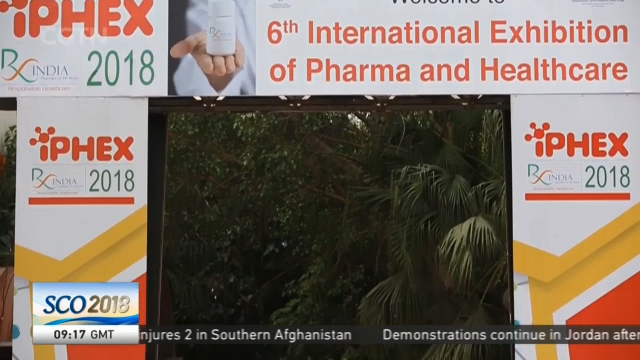
18:03, 05-Jun-2018
2018 SCO Summit: China-India pharma trade sees challenges and opportunities
04:23

China recently removed import duties on as many as 28 medicines, including all cancer drugs, from May 1st. And that's a move which could help Indian pharmaceutical companies. Even as this move is poised to lower the burgeoning trade deficit between China and India, the industry in India says that much more needs to be done before exports start to reflect in the numbers. Our India Correspondent Shweta Bajaj reports.
Brawn Biotech is a 3-decade old pharmaceutical company from India. It sells its products to 60 countries worldwide. But China is not one of them. Brawn Biotech's Managing Director Arun Mudgal is in the process of setting a new plant and 2 Research & development centres in India, to expand its global presence. It is hoping that the next market it gets to enter is China but there is a roadblock. For Pharmaceutical companies getting through the Chinese FDA is one of the biggest issues.
ARUN MUDGAL MANAGING DIRECTOR, BRAWN BIOTECH LIMITED "A tariff trade barrier is one thing. What we also have to look at is that how a country to country acceptance goes in. Currently, China has a lot of tilt towards, the European and American companies. For Indians, we are cost effective in formulations, we have a very high learning curve in formulations. Chinese budget on healthcare can also reduce drastically, if they really strengthen their relationship with India for formulation imports because China is very high on learning curve on API but on formulations, they are not as good as India."
This is one of the largest pharmaceutical exhibition in India organized by India's pharma export council. The council expects India's pharmaceutical exports to rise to 20 billion dollars by 2020. But India's pharma exports to China though on a rise are small in numbers. In 2016-2017 India's pharmaceutical export was 145 million dollars that went up to 200 million dollars in 2017-2018. The jump of 37% though encouraging, the numbers need to rise significantly.
SHWETA BAJAJ NEW DELHI "For India, its pharmaceutical sector is a massive strength for its export market. Currently, its biggest market is the United States of America. But the market only increasing in other Asian countries topped by China, it expects it to become a prospective big market."
China cut tariffs on 28 medicines, including cancer drugs from India. Approvals in China take anywhere between 3 and 5 years. Uday Bhaskar is the Director General of Pharmexcil – India's pharmaceutical export promotion council. He says, for Indian companies' long approvals remain a hurdle.
UDAY BHASKAR DIRECTOR GENERAL, PHARMEXCIL "Today they are giving exemptions, they are opening up and particularly the 28 drugs for oncology, so unless Indian companies are registered and approved by the Chinese FDA, you can't export. So, that is one of the biggest hurdles. I think if it is within 1 year or 2 years that is going to help us but certainly this is a positive development and Indian companies can make use of this opportunity."
Even as the world over Indian pharmaceutical companies have a big presence, Chinese market remains unexplored.
UDAY BHASKAR DIRECTOR GENERAL, PHARMEXCIL "One country having 7 companies in the top 20 generic companies is India, India is number one in pharma. Indians are like any multinational companies and have a significant presence throughout the world. So, there are 2-3 players who are thinking of going back to China to start their manufacturing units."
India has been asking China for long to open up its IT and pharmaceutical firms to reduce the trade deficit which is more than 50 billion dollars. But removing the bureaucratic hurdles will decide how healthy pharmaceutical trade between China and India can be. Shweta Bajaj, CGTN, New Delhi, India.

SITEMAP
Copyright © 2018 CGTN. Beijing ICP prepared NO.16065310-3
Copyright © 2018 CGTN. Beijing ICP prepared NO.16065310-3